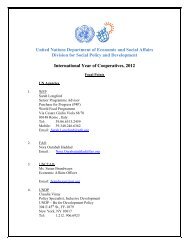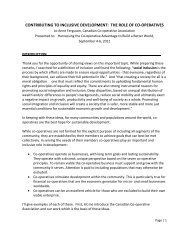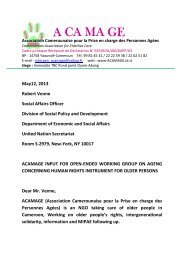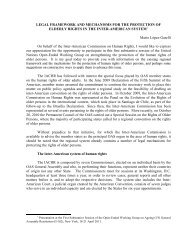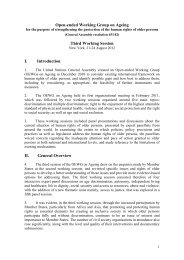Participation of Cooperatives in the Provision of Social Protection
Participation of Cooperatives in the Provision of Social Protection
Participation of Cooperatives in the Provision of Social Protection
You also want an ePaper? Increase the reach of your titles
YUMPU automatically turns print PDFs into web optimized ePapers that Google loves.
(TO THEIR MEMBERS)
Unlike developed countries where<br />
social security schemes that provide<br />
social protection to <strong>the</strong>ir citizenry<br />
are <strong>in</strong> place, such schemes are nonexistent<br />
<strong>in</strong> most <strong>of</strong> Africa ow<strong>in</strong>g to<br />
chronic poverty.
1.As member-based social and economic organizations, cooperatives can, and <strong>of</strong>ten do, provide various forms <strong>of</strong> social protection. Ex<br />
As member-based, membercontrolled<br />
social and economic<br />
organizations, cooperatives can, and<br />
<strong>of</strong>ten do, provide various forms <strong>of</strong><br />
social protection. Examples abound<br />
<strong>of</strong> such cooperative <strong>in</strong>itiated<br />
schemes.
Sav<strong>in</strong>gs and Credit Cooperative Societies<br />
(SACCOS) provide affordable loans to<br />
<strong>the</strong>ir members who would o<strong>the</strong>rwise have<br />
no access to credit from private f<strong>in</strong>ancial<br />
<strong>in</strong>stitutions. Such loan are used to start<br />
small enterprises, improve house<br />
improvement, school fees, agricultural<br />
production, house-household goods and<br />
also to cover medical expenses.
• Different countries have different forms <strong>of</strong><br />
<strong>in</strong>formal traditional sav<strong>in</strong>gs and loan schemes,<br />
some <strong>of</strong> <strong>the</strong>m centuries old. They are all based<br />
on mutual trust. Many <strong>of</strong> <strong>the</strong>se can be<br />
converted <strong>in</strong>to formal sav<strong>in</strong>gs and credit<br />
cooperatives or pre-cooperatives
• Cooperative banks provide loans to <strong>the</strong><br />
cooperatives that own <strong>the</strong>m. Such loans enable<br />
<strong>the</strong> borrow<strong>in</strong>g cooperatives expand <strong>the</strong>ir<br />
enterprises which <strong>in</strong> turn benefit <strong>the</strong>ir<br />
members. Such banks also support special<br />
programmes for cooperative members and<br />
<strong>the</strong>ir communities. For example, <strong>the</strong><br />
Kilimanjaro Cooperative Bank supports<br />
women cooperative groups to start new<br />
enterprises or improve exist<strong>in</strong>g ones, thus<br />
<strong>in</strong>creas<strong>in</strong>g <strong>in</strong>comes
Most farmers’ cooperative societies provide<br />
farm <strong>in</strong>puts on credit (implements, seeds,<br />
fertilizers, pesticides, pack<strong>in</strong>g and build<strong>in</strong>g<br />
materials, hire <strong>of</strong> farm mach<strong>in</strong>ery, etc). The<br />
money is repaid when <strong>the</strong> farmer-member<br />
sells his crop through <strong>the</strong> cooperative.<br />
When necessary cooperatives may <strong>of</strong>fer<br />
guarantees for members borrow<strong>in</strong>g from<br />
cooperative banks or o<strong>the</strong>r <strong>in</strong>stitutions.
The Warehouse Receipt System<br />
protects <strong>the</strong> member from low<br />
prices <strong>of</strong>fered at harvest time by<br />
enabl<strong>in</strong>g him/her acquire credit<br />
to live on until <strong>the</strong> price is right.
Insurance cooperatives provide<br />
protection to members and <strong>the</strong>ir<br />
property. They also provide cover<br />
for <strong>the</strong> members’ assets <strong>in</strong> <strong>the</strong><br />
cooperative. Many sav<strong>in</strong>gs and<br />
credit cooperatives provide loan<br />
protection cover. Cooperative micro<br />
<strong>in</strong>surance is becom<strong>in</strong>g <strong>in</strong>creas<strong>in</strong>gly<br />
common
• In <strong>the</strong> past cooperatives have created Crop<br />
Stabilization Fund to protect <strong>the</strong>ir<br />
members aga<strong>in</strong>st a drastic fall <strong>in</strong> prices.<br />
This is best done at state level.
The Soweto Home-based Care-givers<br />
Cooperative Society <strong>in</strong> South Africa<br />
provides medication, food, counsel<strong>in</strong>g,<br />
ambulance and general care to persons<br />
liv<strong>in</strong>g with HIV and AIDS<br />
The Kilimanjaro Native Cooperative Union<br />
<strong>in</strong> Tanzania is us<strong>in</strong>g part <strong>of</strong> its pr<strong>of</strong>its to<br />
support orphans and children from very<br />
poor families by pay<strong>in</strong>g for <strong>the</strong>ir school<br />
fees, uniforms and meals. So far ….. have<br />
been supported
A women’s cooperative <strong>in</strong> Swaziland supports<br />
orphans and persons liv<strong>in</strong>g with HIV-AIDS<br />
Among o<strong>the</strong>r th<strong>in</strong>gs, <strong>the</strong> Okondjatu Kasojetua<br />
Youth Group <strong>in</strong> Namibia has enhanced life<br />
skills and raised awareness <strong>of</strong> <strong>the</strong> challenges<br />
fac<strong>in</strong>g school children through <strong>the</strong><br />
establishment <strong>of</strong> four school HIV/AIDS clubs.<br />
It has also <strong>in</strong>creased <strong>in</strong>come for vulnerable<br />
children by establish<strong>in</strong>g <strong>in</strong>come generat<strong>in</strong>g<br />
activities for <strong>the</strong> Kaso band and Kasojetua<br />
choir group members
Some cooperatives have sponsored<br />
members’ children for advanced studies<br />
with<strong>in</strong> and outside <strong>the</strong>ir countries<br />
• Health <strong>Cooperatives</strong> provide health services to<br />
members and <strong>the</strong>ir families at a nom<strong>in</strong>al fee<br />
• Funeral/Burial <strong>Cooperatives</strong> provide cover for<br />
members and <strong>the</strong>ir families
• Hous<strong>in</strong>g <strong>Cooperatives</strong> enable <strong>the</strong>ir members<br />
acquire shelter - ei<strong>the</strong>r by construct<strong>in</strong>g houses<br />
(where members contribute labour and money)<br />
or by putt<strong>in</strong>g up houses that are leased to<br />
members at affordable rent.
• <strong>Social</strong> Services <strong>Cooperatives</strong><br />
• There are various types <strong>of</strong> social services<br />
cooperatives that provide one form <strong>of</strong><br />
protection or ano<strong>the</strong>r. The dist<strong>in</strong>ct feature <strong>of</strong> a<br />
social services cooperaative is that it is <strong>the</strong>re to<br />
provide a public service need by <strong>the</strong><br />
community ra<strong>the</strong>r than to carry out commercial<br />
activities. They are strictly service oriented. A<br />
health cooperative is one <strong>of</strong> <strong>the</strong>m. But <strong>the</strong>re are<br />
o<strong>the</strong>rs, too…….
• Cooperative schools: where parents lack<strong>in</strong>g<br />
school facilities for <strong>the</strong>ir children put up class<br />
rooms and equip <strong>the</strong>m, hire teachers, purchase<br />
books, etc. and operate as a private school.<br />
They will <strong>of</strong> course pay a nom<strong>in</strong>al fee, enough<br />
to cover salaries and o<strong>the</strong>r operat<strong>in</strong>g costs. The<br />
idea is not to make money out <strong>of</strong> <strong>the</strong> school but<br />
to provide a commonly needed service.
• Water consumers’ cooperatives: People <strong>in</strong> a<br />
community may need water but feel that<br />
nobody is go<strong>in</strong>g to provide it unless <strong>the</strong>y do<br />
someth<strong>in</strong>g for <strong>the</strong>mselves. They may raise<br />
some money as a cooperative, s<strong>in</strong>k a well – or<br />
several wells, pumps out <strong>the</strong> water and use it.<br />
They may need to make small regular<br />
contributions to ma<strong>in</strong>ta<strong>in</strong> <strong>the</strong> well and <strong>the</strong><br />
pumps, or even s<strong>in</strong>k more wells.
The various types <strong>of</strong> cooperatives and <strong>the</strong><br />
schemes discussed here do help cushion<br />
cooperative members aga<strong>in</strong>st <strong>the</strong> harsh impact<br />
<strong>of</strong> poverty – more so <strong>in</strong> <strong>the</strong> absence <strong>of</strong> a<br />
universal social security system.<br />
Thank you





